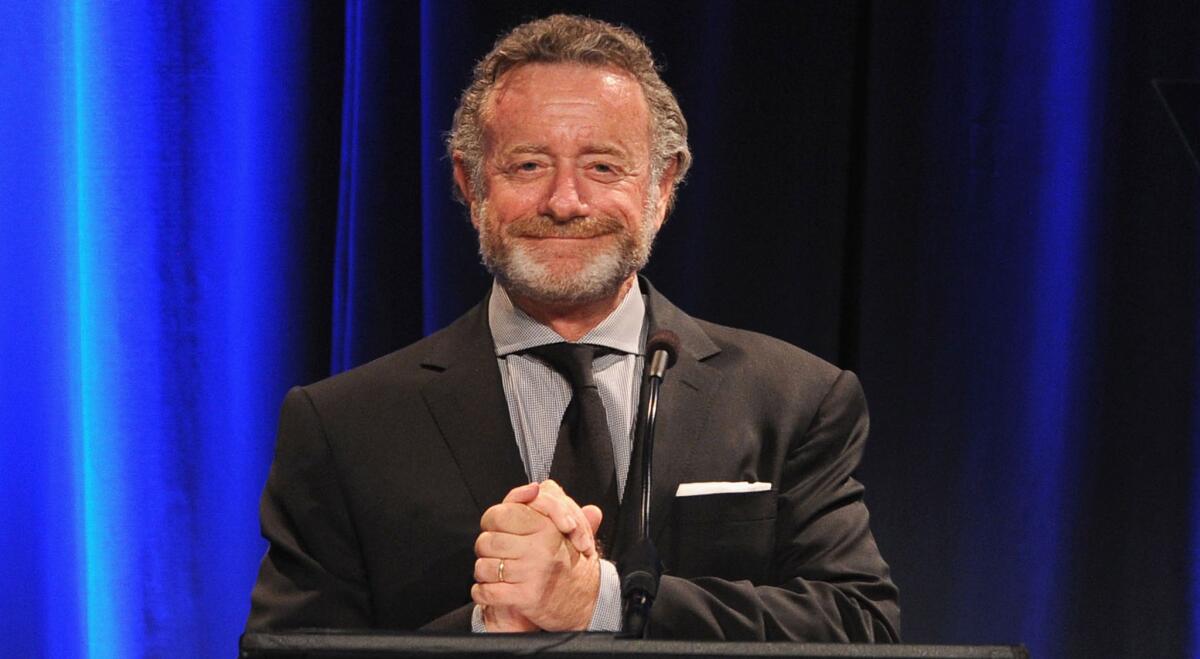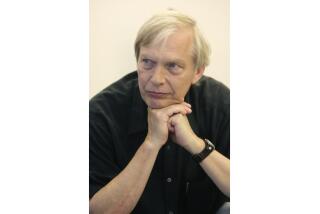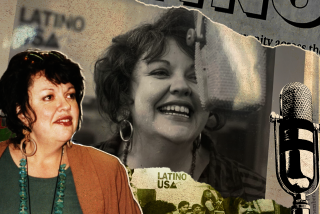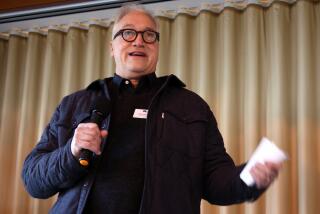NPR picks L.A. media veteran Jarl Mohn as its new chief

Pasadena public radio station KPCC-FM (89.3) grabbed the national spotlight with Friday’s announcement that Jarl Mohn, the media industry veteran who ran E! Entertainment Television through most of the 1990s, will be National Public Radio’s next president and chief executive. He succeeds interim President and CEO Paul G. Haaga Jr. starting in July.
Mohn, who was the founding president and CEO of the media investment company Liberty Digital and held a senior position at MTV and VH1 before going to E!, is currently chairman of KPCC’s parent company, Southern California Public Radio (SCPR). He’s been on the board of KPCC for 12 years and chair of the board for the past 2 1/2 years. Now, with Mohn soon to be at the helm of NPR, many fans and industry observers are looking to KPCC for clues as to what might be in store nationally for the public radio institution.
Mohn’s background “makes him ideally suited to lead NPR as it continues to expand its reach and play a unique role in public service journalism and cultural programming,” said NPR board Chairman Kit Jensen in a statement.
In an interview with The Times, Mohn said that chief among his goals is to “provide an element of stability in terms of turnover.” NPR has seen seven CEOs including him as well as interim executives over the past eight years.
Gary Knell resigned in 2013 as CEO after less than two years to become president of the National Geographic Society. He was replaced by Haaga. In 2011, Knell’s predecessor Vivian Schiller left NPR after a senior executive was caught on video making disparaging remarks about the tea party movement.
“I made a five-year commitment,” said Mohn, who will keep his Brentwood home, but move to Washington D.C., where NPR is based. Stability is important, he added, in order for NPR to “continue the day in and day out job of news reporting and journalism.”
Second order of business? Fundraising. NPR currently has a deficit of approximately $6 million.
“It’s something that’s fixable,” Mohn said. “But we shouldn’t define the organization by its problems, we should define it by its opportunities. And there’s great opportunity here.”
That means tapping into a loyal base of listeners and foundations with resources, he said. At KPCC, Mohn and former board chair Gordon Crawford were two big resources. Their gifts to KPCC went toward building the $23-million Mohn Broadcast Center — Mohn alone gave, he said, “in the 4-million range for the building itself, plus annual gifts.”
Part of his long-term vision for digging NPR out of its financial hole is to execute an ambitious capital campaign to raise money for both NPR and member stations. “I just don’t want to preserve NPR, I want to really grow it,” he says. “The audience is engaged and they want to be part of the dialogue. Many of them are high-net-worth individuals who have the capacity to give larger gifts than they’re giving.”
Mohn also intends to increase corporate underwriting and sponsorships and tap into digital content models. “People are willing to pay money — I pay $10 to Spotify every month — why not also target audiences [for fundraising] on the digital platforms?”
During Mohn’s time at KPCC, the station has undergone significant programming changes and steep growth. KPCC has made a shift toward all news and information and diversified its staff as well as its audience. “It’s gone from the fourth most listened to public radio station in the L.A. [market] to the third or fourth most listened to public radio station in the country,” said Bill Davis, SCPR president and CEO. “We’ve gone from being an overwhelmingly Anglo audience to about 45% people of color.”
Davis attributes much of that growth to Mohn’s “infectious passion,” marketing savvy and fundraising know-how at the local level. “If his experience at NPR is congruent with his experience here at KPCC, you’re gonna see NPR’s audience grow and become more diverse — and people at all levels willing to support that kind of public service content,” Davis said. “I think his skill set is unmatched in public media and he has the potential to be a really transformative president for NPR.”
Mohn flips the credit back to Davis and others at KPCC, saying he’s learned from them “99% of what I know about public radio.”
“KPCC has been a wonderful laboratory and great model for expanding diversity. The station sounds like L.A. — the voices, the accents, the names, the stories,” Mohn said. “It has to do with recognizing the terrain. We need to do the same thing at NPR, recognizing the terrain of the United States. Not just ethnic diversity, but also political, age, income, geography.”
Accurately reflecting the local terrain of its member affiliate stations is also how Mohn intends to fight the sentiment that NPR has an East Coast bias — something the network already tried to address when it established NPR West in November 2002.
“I think we’ll proceed in that direction because [NPR] can’t sound like Washington, D.C. — it has to sound like the country,” Mohn said.
One thing that Mohn is still unsure of — the role of music initiatives at NPR.
“Music is a very big part of the mandate of NPR,” he said. “It’s news and cultural programming. I don’t have enough experience in the public radio approach to music programming. I’m not foreign to it, but I’ve been focused first and foremost on the news and information piece. I have no intention of paring it back or increasing it yet; I wanna see how the member stations and the user/listener base feel about it and get a sense of how to proceed.”
It should be noted, however, that Mohn began his career as a disc jockey in 1967 and was on WNBC-AM in New York in the 1970s.
Will Mohn’s alliance with KPCC mean special treatment in terms of aiding the station in rolling out some of its highest rated shows nationally?
Mohn is ever-diplomatic about that. “The folks at NPR will learn very quickly that I’m a very collaborative guy; and the worst thing would be to try to jam any personal agenda. I will thoughtfully put forward anything I think is the right thing to do and we’ll have spirited discussions about it.”
More to Read
From the Oscars to the Emmys.
Get the Envelope newsletter for exclusive awards season coverage, behind-the-scenes stories from the Envelope podcast and columnist Glenn Whipp’s must-read analysis.
You may occasionally receive promotional content from the Los Angeles Times.












